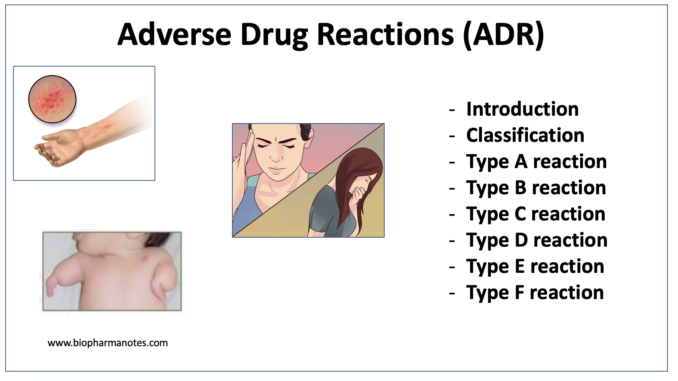
- Adverse drug reaction (ADR) are unwanted effects of drugs in normal therapeutic dose. It’s definition by WHO (World Health Organization) is ‘any response to a drug that is noxious and unintended and that occurs at doses used in man for prophylaxis, diagnosis or therapy of disease or for modification of physiological function’. Since 2012, this definition also includes reactions which occurs as result of error, abuse or misuse and suspected reactions to off-label medicines. ADR can be local or systemic.
- It doesn’t include adverse effects of drug due to drug overdose.
Classification of Adverse Drug Reactions
- According to traditional classification proposed by Rawlins and Thompson, ADR can be majorly classified into two types: Type A and type B. There are other minor categories of ADR- type C, type D, type E and type F.
Type A (augmented) adverse drug reactions
- These reactions are also known as augmented, quantitative or dose dependent reactions. They can be predicted based on pharmacology of drug. These reactions may occur due to extension of pharmacological effects of drug, low therapeutic index of drug or due to action of drug on another site. It constitutes around 80% of ADRs.
- Examples- Use of insulin in type 1 diabetic patient may cause hypoglycemia (extension pf primary pharmacological effect of insulin), nausea caused by digoxin (due to low therapeutic index).
Type B (Bizzare) adverse drug reaction
- These reactions are termed as bizarre or idiosyncratic reactions. It is difficult to predict these reactions from pharmacological actions of a drug. These are not dose dependent, have severe effects, and occur infrequently. Underlying cause may be genetic or immunologic or unknown. Examples include allergy or anaphylactic reactions.
- Allergic reactions develop due to inappropriate response of body’s immune system towards drug. It is also termed as sensitization. Once the person is sensitized to drug, later use of the drug may cause severe allergic reactions.
- Idiosyncratic reactions occur in very small number of people and are more severe. The mechanism may be unknown or due to genetic difference in the way the body metabolize or respond to drug.
- Example- aspirin and other salicylates cause hemolysis in people whose RBC lack G6PD (Glucose 6 Phosphate Dehydrogenase) enzyme.
Type C (Chronic) adverse drug reactions
- These are dose and time related reactions which may occur due to prolonged use of drug or due to drug accumulation. Example includes prolonged use of corticosteroids may cause hypothalamic- pituitary- adrenal suppression.
- This is usually managed by reducing the dose of drug or by withdrawal of drug use for certain period.
Type D (Delayed) adverse drug reactions
- These are time related reaction and are caused due to prolonged use of drug which doesn’t tend to accumulate in body.
- Example includes – prolonged use of typical antipsychotics may cause tardive dyskinesia; vaginal adenocarcinoma causes due to diethylstilbestrol.
Type E (End of dose) adverse drug reactions
- These are withdrawal reactions which occur when drugs are stopped after using for certain time.
- Example- rebound hypertension after stopping clonidine. Opiate withdrawal syndrome.
- Drugs with such risks should be stopped gradually, not abruptly.
Type F (Failure) reactions
- They occur due to unexpected failure of therapy or due to undesirable reduction in drug’s efficacy. Such reactions are common, dose related and often caused by interaction with other drugs.
- Some examples include increased clearance of drug by dialysis leading to reduction in drug’s efficacy, concurrent administration of oral contraceptives with some specific enzyme inducers may increase its metabolism and results inadequate dosage.
References
- https://derangedphysiology.com/main/cicm-primary-exam/required-reading/variability-drug-response/Chapter%20320/classification-adverse-drug-reactions
- https://www.merckmanuals.com/home/drugs/adverse-drug-reactions/types-of-adverse-drug-reactions
- Coleman JJ et al. Adverse drug reactions. Clin Med (Lond). 2016 Oct; 16(5): 481–485.
- Edwards IR etal. Adverse drug reactions: definitions, diagnosis, and management. Lancet. 2000 Oct 7; 356(9237): 1255-9.
- A textbook of clinical pharmacology and therapeutics.
- Pharmacology and pharmacotherapeutics. 24th edition